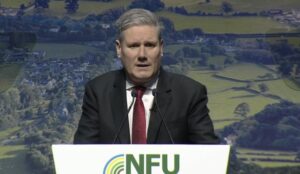The decision to call a July 4 general election has already had an impact on some big policy issues affecting the pig sector and will have longer-term implications on others. ALISTAIR DRIVER looks into some of the hot topics.
Rishi Sunak’s July 4 general election call took pretty much everyone by surprise, including, it seemed, many within his own government.
The election, with the polls suggesting the likelihood of a Labour government for the first time since 2010, will have significant implications for the farming sector.

The Conservative government has had its ups and downs with the farming community in recent years, particularly as it sought to navigate the post-Brexit world, and Labour, which has had an even rougher ride in Wales, the Liberal Democrats and Reform will be looking to take advantage, while Plaid Cymru, in Wales, and the Scottish National Party will also be trying to win over the farming vote.
Until we see the manifestos, of course, it will be impossible to gauge exactly what the all have in store for the food and farming industry.
For the pig sector, just the timing of the election has had an immediate effect on some topical policy areas, while it raises a number of important longer-term questions on others.
Regulation on pig contracts
Defra’s drive to introduce regulation to bring about fairer supply chains, starting with the dairy sector before moving on to pigs and then other sectors, was widely welcomed across the farming sectors.
The much-delayed dairy regulations were introduced earlier this year and new regulations, developed in close collaboration with the NPA and others, governing pig contracts had moved tantalisingly close.
Farming minister Mark Spencer had made it clear the plan was for the regulations to be in place by the summer, before an expected autumn election, but the process is now very much on hold.

Speaking at the British Pig & Poultry Fair (BPPF), before the election was called, NPA chairman Rob Mutimer said he was confident the latest iteration of the regulations he had seen would offer extra protection for pig producers. “I think Defra has listened to all sectors, processors and farmers. While not perfect, from where we were sat two years ago, this would be a move in the right direction,” he said.
Sofina Pork’s Mark Haighton warned that rules around failure to take and supply committed volumes of pigs ‘could be a double-edged sword’, but for producers, generally, the halt to the process is a blow.
It has to be assumed that a re-elected Conservative would take the regulations forward again, while shadow farming minister Daniel Zeichner has said Labour also wants to pursue policies that deliver fairness in the chain and suggested Labour might even look to go further.
It seems likely that the regulation will return, but the questions are when – as parliamentary time will be at a premium after the election – and in what form.
Fairer labelling

There will be fewer tears shed about the demise of Defra’s plans to introduce new legislation intended to bring about fairer labelling.
While proposals to improve country-of-origin labelling were generally welcomed, the convoluted plan for a tiered method-of-production (MOP) labelling system had been widely condemned and derided, with Mr Mutimer describing it as the worst consultation he had ever seen.
In its response to the consultation, the NPA said the MOP plans would add cost and complexity to the supply chain, while failing to deliver on their objectives of enlightening consumers about animal welfare and driving improvements on farm.
These concerns were echoed at the BPPF by Mr Haighton, while, in its response, Red Tractor agreed that MOP is ‘not an indicator of animal health and welfare’. It warned the MOP proposals would ‘confuse consumers’ and ‘undermine trust in British food’ and Red Tractor’s core standards, which would be placed in the fourth tier out of five.
Even Mr Spencer was clearly unconvinced, telling Pig World that he shared the industry’s concerns that method of production was not a good indicator of animal welfare.
“We have to find a way of making sure we get fairness into labelling, but that we don’t mislead consumers,” he said, adding ‘there’s no point having a consultation if you’re not going to listen to the responses’.
The plans, which others within Defra still appeared to be pushing hard despite the backlash, are gone for now, but not necessarily for ever. The industry will be hoping they don’t return any time soon.
Border controls

The government has also come in for heavy criticism over its approach to border controls, particularly the decision to slash funding for illegal meat checks at the Port of Dover from April to divert to the new Border Target Operating Model.
There was no sign in the run-up to the election that Defra was planning to change its stance on this. Mr Zeichner said in January that cutting funding for illegal import checks would be ‘both foolish and dangerous’, so it remains to be seen whether Labour will take a different approach.
A manifesto pledge from any party to properly regulate trade at Dover and other ports and airports would certainly be a pig industry vote winner.
Farrowing system reform
A commitment to ban conventional farrowing crates was a surprise omission from the 2019 Conservative manifesto, after the momentum had built rapidly in the run-up.
The government’s foot has come off the pedal since then for a variety of reasons (see p22), so it will be interesting to see whether it features in the 2024 version, especially with the European Commission and some member states having already moved on this.
It would be a surprise if a commitment of some sort didn’t appear in the Labour manifesto, among other farm welfare initiatives. Mr Zeichner has indicated, however, that Labour is conscious of the need for any proposals to be framed in a way that doesn’t undermine the UK pork sector.
This could become a big issue for the pig industry in the next parliament and, while some would welcome certainty on it, the industry will be seeking plenty of reassurances on how the process would be handled.
Schemes and grants
After a very sticky start, the government’s Sustainable Farming Incentive in England (a devolved policy) has been made more attractive to some, at least, while new grants available with funds cut from Basic Payments are proving useful to some pig businesses.
The current government has set out its position on the transitional agricultural policy many times. Labour’s stance in its manifesto will be awaited with great interest across agriculture, particularly after the fiasco of the Labour Welsh government’s attempts to impose environmental schemes that would have caused huge damage to Welsh farming.
Will it learn its lessons and seek a better balance between environmental and food production and security goals, as Westminster shadow ministers have been promising? And will it maintain the current government’s path on grants?
Other policy areas
- Net zero: The move towards net zero will clearly be a focus in all manifestos, with potentially far-reaching consequences for farmers.
- Labour availability: This has become a huge constraint for food and farming, particularly since post-Brexit barriers to European labour were erected. Will there be any meaningful pledges on migrant and domestic labour, including skills and training?
- Planning constraints: Identified as another significant barrier to food and farming industry growth, manifestos will be scrutinised for signs of reform to make it easier for farmers to replenish and expand their physical infrastructure.




